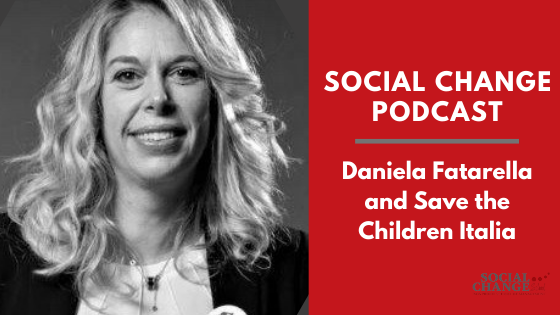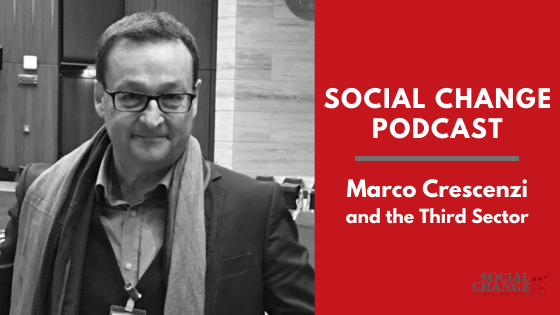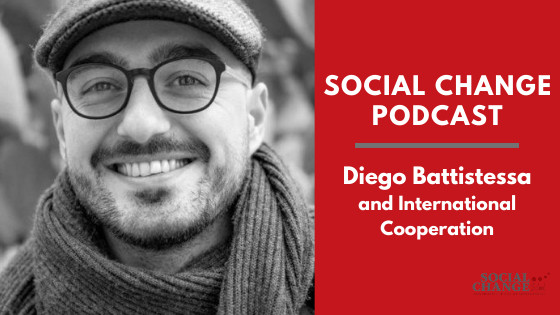Andrea: Good Morning and welcome to the new episode of the Social Change Podcast realized by the Social Change School in cooperation with Eduway social business.
We are ready to welcome to our podcast Daniela Fatarella, General Director of Save the Children Italia!
Daniela Fatarella : Good Morning I am really happy to be here with you.
Andrea: To create a social impact and bring benefit to the people we need a combination of competences and passion, so we are really curoius to know where is this passion coming from for you?
Daniela Fatarella : I have always been passionate about working in cooperation and in general in solidarity. I studied it and then did some experiences that led me then to what I do today. One I particularly remember and that I consider key for the role I cover today happened in 1996, when I did my Erasmus in London, there I met the professional non-for Profit (NFP) world, and for someone like me coming from many volunteering experiences in organizations having a culture of passion and solidarity and not competences was enlighting because there I found professionality and I understood that it could be a profession, and my entire world changed, and I started to do the best job in the world.
I have a great privilege, and a huge responsibility of course, to know that me and many other people in the sector, do something that do not stop on our desks, is goes beyond, and for this reason passion is a key element of my motivation to work in the sector, as it is for many others.
Andrea: The opportunity to interview the chief of such a big and important organizations as Save the Children Italia is too big not to jump immediately the questions.
Let’s talk about your organization that works in a unique way compared to the others in Europe, with a huge and continuous growth, looking at the last 13 years, considering also the pandemic period, the Italian section has quadrupled the numbers of donors, from 100 000 in 2006 to 400 000 in 2019. Which are in your opinion the reasons of this success?
Daniela Fatarella : I believe that the big adventure in Save the Children Italia is made of 3 P: PEOPLE, PASSION AND PROFESSIONALITY.
The first P, is People and our sector is made of them, we work for kids in Italy and in the rest of the world, we do not have a product. Our success is because of our team that made the difference thanks to a contributive strategy, being team players, looking at goals and having the right people. I believe the thing that makes us different is the human quality we bring, that is visible everywhere from the administration to the marketing.
The second P is Passion, is what motivates us every day, makes us come to work in the morning and allows us to go beyond, that makes us come to work with enthusiasm and allows us to understand our responsibility very single day.
If you do not have passion, you cannot do this job, because it is a privilege and needs to be taken as a continuous challenge.
The third P is Professionality, Save the Children has always been a really professional organization, and in Italy we have been supported by the anglo-saxon branches, this means we grew up with the English/American method that allowed us to be always ready to understand competences and implement our work with professionality, and it is really important that this last element, completes the passion part. Before I said it is impossible to do this job without passion, but I have to add that it is equally important not to do it without professionality.
We have been often addressed as the “multinational welfare”, and if this means that we are prepared and efficient we welcome this definition with joy, because we are an organization that , connects donors and beneficiaries, to create value and impact in an efficient use of the resources, professionality means hard but also soft skills for us.
A lot of emotional intelligence and team work, to underline this I can say that our main strenght in all these years has been the ability to be a gentle force, since our fonder Eglantyne, that more than 100 years ago, changed in a really brave way, how we see children, we as Save the Children Italia have her gentle force. The ability to work with kindness means to have courage, and a good use of fear, the contrary of resignation, because we face the world aware both of its complexity and our ability to change it.
Kindness and courage mean taking responsibility for our actions, so it is a founding elements that create a sense in human interactions and in our actions, I believe this is what made Save the Children what it is today, and will keep making the difference because we put People Passion and Professionality first
We are a gentle force, because we also put kindness and courage in the equation.
Andrea: Integrating this with values also, it might have happened to many to see one of your marketing campaigns, with emotional photos, that make believe to others in the sector that Save the Children Italia is a war machine based on marketing and communication, and some might even say it works in a non-ethical way, what would you like to say about it?
Daniela Fatarella : I would like to offer a complete vision on the topic, since many people often stop looking at the growth of our organization only based on number of fund-raising that is for us only a mean to our goal, impact. The idea of creating impact guides our organization from the roots, it is clear that we believe it is a key element of our success, bringing impact at local level and alos advocating in many activities, to modify the contests where we operate and where our beneficiaries live.
We are not just a charity, we also do advocacy to bring a change on bigger scale and generate impact, and to do it, it is necessary to be independent economically, so to be able to act where we think it is needed with the programs we think are relevant in a specific situation. Our organization it’s indipendent because we want to work where is more needed, to influence governments and istitutions and mobilize thousands of people. For this reason, we have more than 500 000 donors supporting us, because they do not only support us financially but they are part of our voice and our strenght.
To reach many people we often use channels and photos that might be unconventional, aqnd I am completely aware that sometimes the tone of voice of our communication strategy it might be felt as strong, but we do it because it is a realistic denounce of urgent situations, that sadly involve many children. To do an effective communication in few seconds it is necessary to be effective and explain in a direct way the problem, but most importantly how to solve it.
Sadly this photos are real, I have recently been in a trip before the pandemic in Somalia, and I have seen with my eyes the situations that we show in pictures, so children starving in need of urgent help, and I believe is outrageous what it is happening, and this is what we want to show to people to push them support us and help us in our battle.
I also want to add that, we are aware of the fact that in showing pictures of specific countries might give a bad image of the country itself, extreme maybe, but they are only an aspect of our job, since we aim to activate a deep relationship with our donors that can then meet and have more information to complete their awareness on our activities, so the photos we show are always real, and not filtered, they are as we see when working on the field.
Andrea: I surely believe that your communication strategy leads people to support the change you are making in the world, to fight injustice, Eglantyne, your founder, wanted to do. She has been one of the first ones to see children as subject to rights not only objects
She must have been key in the political decisions taken from the beginning of the century.
You spoke about advocacy, and I want to ask you something more about it… how can an organization as Save the Children Italia influence governments and decisions processes?
Daniela Fatarella: I would like to remember the words of our Eglantyne Jebb because she has been the starting point of a revolution
Her vision is still now drammatically relevant. She started from the fact that kids were considered as objects, property of parents and/or governments, and changed it to principal subjects, humans. With this new vision she changed a lot of things, inspired the conventions of children’s rights, and changed the point of view of institutions.
Che created Save the Children with a protest in Lecester Square in 1919 to protect the german kids soffering for the embargo and was arrested for this by the british governement because she was “defending the enemies”.
Since the beginning Save The Children does advocacy in roder to influence, in the way organizations can do at round tables with institutions at national and international level.
This is one of our main jobs, because once the law is changed, society also qill change and the way children are seen in it, and it has impact on only on them but on the entire system
To do this it is important to know how it works on the field and actually be there, to understand and then influence a positive change. This i show we work and it is really important in this case not to loose the final goal.
Andrea: Daniela you were talking about context and the power of change, the nit comes natural to ask, what do we have after, what do you see coming in the future of Save the Children and NGOs in general?
Daniela Fatarella : I start from the challenges I see. In general I believe that we as Save the Children, the biggest challenge will be the fight for inequality, we can see it even more now with covid even in the same country, like our, in Italy we can see huge inequalities and am sure in the next years this wil be a bigger thing to face for our sector, because an empowerment of beneficiaries in needed and to achieve this we need a huge change.
Another challenge would for sure be the need to innovate. I see innovation as new solution to old problems. For this also covid showed us there is a huge space for growth and also we need to innovate and find new ways to solve things, to make partnerships, to find money, to measure our impact.
Nowadays we talk a lot about impat finance, that is a challenge for sure also for the third sector. The ast one I see is the need to share and best practices and competences key for implementation of projects. I truly believe that we need to cooperate more and share successes in rder to help each other and be all more impactful. I want to add another challenge, the need to make our donors feel like they are part of something, share with them what do we do with their money, how do we have an impact with our projects
There are also many opportinities, the biggest ones i see are the local territories and communities made by the beneficiaries themselves. Thinking boau the covid perioda gain, the biggest support was given and received by the communicties that needed help, with innovative ideas and new solutions. For the same reason also youth participation is key , also to make them understand their voice is heard. We can learn a lot from them, and in our youth movement there are many people that push us toward a positive change.
I also see volunteering as a chance, and during covid we learnt a lot about this too. Communities supporting people they did not know, or families they knew and for this we started a project “Volontari per l’educazione” that put in connection a kid and a university student to fight against school inequalities, all done with a virtual system thanks to technology. There is a huge potential in volunteering, where I see a lot of leadership in these programs that can actually make a positive impact.
Andrea: Thank you Daniela, now we would like to know some stories from the field, tell us some relevant episodes about your carrer.
Daniela Fatarella : I already talked about my period in London, so I want to talk about one of my last trips before the pandemic, in Somaliland,in 2019. This peiod there has been for me important and impacting. We arrived during a food crisis, no rain since months, dry land, dust and dead animals around. In one of our clinics we met a mother with a 3 years old child with a weight of 8 kilos, undernurished crying all day long, in pain. This child died some days after we met them. I clearly remember this experience because it left a footprint in my brain, because I saw something outrageous, and it made me rememebr why I do this job, and how big is my responsability and also reminded me that I cannot afford to give up, because I don’t want something like this to happen again.
Andrea: Thanks for your story, it was really inspiring, and also for this chat, it was a pleasure to talk to you and to discover more about Save The Children and the third sector.
Daniela Fatarella : Thank you!




